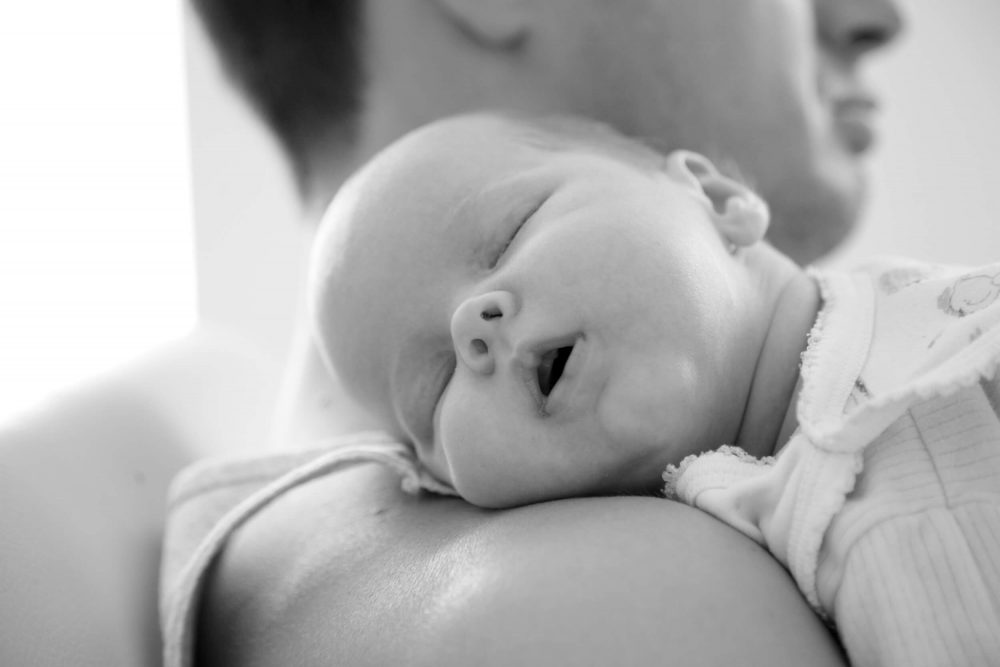What does it mean when a baby sleeps with their mouth open? What can cause mouth breathing in babies and when to see your doctor? Keep reading to find the answers for these questions.
When it comes to watching your baby sleep, many parents bask in the quiet and beautiful sight, taking in every breath, and soaking in the cuteness. But there is something you want to look for when gazing down at your sleeping baby.
A baby that sleeps with their mouth open, also known as “mouth breathing,” may be showing signs of some upper respiratory issues or a condition called pediatric obstructive sleep apnea.
While not always cause for concern, it is important to ask yourself “why does my baby sleep with his mouth open?” and rule out any potential health issues. Read on to learn why your baby sleeps with their mouth open, ways you can help your baby get better sleep, and when you should consult with your pediatrician.
Why Does My Baby Sleep With His Mouth Open?
When it comes to figuring out the cause of your baby’s mouth breathing, the first question most parents have is “do babies sleep with their mouths open naturally?” The truth is that newborn babies almost exclusively breathe through their noses and the reflex for breathing through their mouths doesn’t develop until 3 or 4 months of age.
This means that if your newborn sleeps with their mouth open, there is likely some way that their nasal passage is being obstructed. In some cases, it could simply be the result of a cold, or allergies. In others, a baby sleeping with their mouth open may be a sign of a more serious health condition.
So, why does my baby sleep with his mouth open? Some common causes of mouth breathing during sleep include:
- Mucus From A Cold Or Illness
- Allergies
- Deviated Septum
- Obstructed Sleep Apnea
- Enlarged Adenoids And Tonsils
- Learned Habit
Worried about how your baby sleeps? Sign up for Dr. Rebecca Spencer’s Masterclass about Baby & Toddler Sleep to learn how to get your baby to actually sleep like a baby.
Treatments For When A Baby Sleeps With Mouth Open
Depending on the cause of your baby sleeping with their mouth open, there is a wide range of treatment options.
For starters, if your baby is congested or has recently had a cold, you can help treat your baby’s congestion at home to curb their mouth breathing. If your baby has no other symptoms and is not having trouble breathing, this is a good place to start.
Try relieving your baby’s congestion with:
- A Humidifier- Moisture in the air can help with nasal congestion. Cool mist humidifiers are the safest and the recommended style for small babies and children.
- A Bulb Syringe- Babies sometimes need help removing mucus and congestion from their noses. Bulb syringes allow you to remove nasal blockages safely, freeing your baby’s airways.
- Saline Wash- Saline sprays are a safe and effective way to thin out and loosen your baby’s nasal congestion so they can breathe easier.
- Hydration- Keeping your baby hydrated with plenty of breast milk or formula helps keep the mucus moving.
When To See Your Doctor For Mouth Breathing
If your baby is not congested, and these treatments do not seem to be effective, you may want to schedule an appointment with your pediatrician to rule out other health conditions.
If your baby is sleeping with their mouth open due to allergies, your doctor may recommend nasal sprays that can help your baby breathe through their nose easier.
Your pediatrician may also discover enlarged tonsils and adenoids or a deviated septum. Depending on the impact they are having on your baby’s sleep, your doctor can provide you with treatment options or recommend surgery.
Enlarged adenoids and tonsils can also cause pediatric sleep apnea. Mouth breathing is a symptom of pediatric sleep apnea and can cause many issues for your child’s sleep quality and also their behavior and development.
Symptoms of sleep apnea in a baby that sleeps with their mouth open include:
- Snoring or noisy breathing during sleep
- Pauses in breathing
- Restlessness during sleep
- Daytime sleepiness or irritability
- Hyperactivity during the day
- Behavioral problems
- Nighttime sweating
Once you have ruled out any congestion, it is important that you discuss the possible reasons why my baby sleeps with his mouth open with your pediatrician. With a few exams and some tests, you will be able to ensure your baby gets the right treatment for their mouth breathing.
Prepare for sleep challenges with your baby – sign up for Dr. Rebecca Spencer’s Masterclass to learn how to identify distinct sleep behavior.
What Can Happen When A Baby Sleeps With Their Mouth Open?
Whether the reason why does my baby sleep with his mouth open is benign or not, mouth breathing overall is a less efficient way to breathe and can lead to other sleep and health problems down the road.
Breathing through the nose delivers more oxygen to the lungs and also filters out bacteria and prevents them from entering the body. It is also imperative to get quality and efficient sleep.
A baby that sleeps with mouth open doesn’t sleep as deeply. This constant sleep deprivation can cause behavioral symptoms like those typically associated with attention deficit hyperactivity disorder (ADHD).
Beyond behavioral concerns, there are long-term health risks associated with babies that sleep with their mouth open. These include:
- Swollen Tonsils
- Dry Cough
- Inflamed Tongue
- Dental Problems (cavities)
- Bad Breath
- Gingivitis
Not only can conditions like pediatric sleep apnea lead to long-term complications like heart problems and failure to grow, but mouth breathing itself can as well. No matter what the cause, you definitely want to address mouth breathing as soon as you can.
Sleeping and breathing go hand in hand, and sleep impacts so much of your baby’s overall health and development.
If you are worried about how your baby sleeps, be sure to sign up for Dr. Rebecca Spencer’s Masterclass about Baby and Toddler Sleep and learn how to get your baby to actually sleep like a baby.








